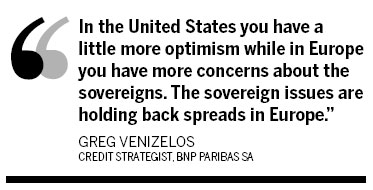Extra yield for corporate debt
NEW YORK - For the first time on record, investors are demanding a smaller premium to own US corporate bonds than global company debt.
Bondholders demand 166 basis points more in yield to hold US investment-grade company debt instead of Treasuries, compared with an average 169 basis-point spread worldwide, according to Bank of America Merrill Lynch data. At the height of the credit crisis in December 2008, companies paid about 150 basis points more to attract US investors to their bonds than borrowers seeking buyers elsewhere in the world.
The shift highlights confidence in North America's economic recovery as companies across the Atlantic in Europe contend with the cost of bailing out Greece and Ireland while waiting to see whether the fiscal crisis ensnares more countries. The US economy is forecast to grow faster this year than either the euro region or Japan, according to Bloomberg surveys.
"In the United States you have a little more optimism while in Europe you have more concerns about the sovereigns," said Greg Venizelos, a credit strategist at BNP Paribas SA in London. "The sovereign issues are holding back spreads in Europe."
The Federal Reserve Board's second round of so-called quantitative easing will boost returns for US bond investors, said John Brynjolfsson, chief investment officer of Aliso Viejo, California-based hedge fund Armored Wolf LLC. The program, also known as QE2, calls for the central bank to buy $600 billion in Treasuries through June.
"With the strong stimulus package and QE2, I expect 2011 to be a relatively strong economy and corporate bonds tend to do pretty well in that environment," Brynjolfsson, who oversees $362 million, said on Dec 3.
"Even if corporate yields rise a little bit it's likely spreads tighten, which corporate bond managers like to see."
Elsewhere in credit markets, corporate bond sales worldwide topped $3 trillion for a second straight year. Leveraged-loan issuance in the US more than doubled in 2010 and bond sales linked to automobile and education loans and credit card debt fell to $92 billion, from $134 billion a year earlier, according to Bank of America Merrill Lynch data.
Junk-rated companies, set a record for corporate bond offerings in the US, data compiled by Bloomberg show. Ally Financial Inc, Ford Motor Credit Co and other speculative-grade companies rated below Baa3 by Moody's Investors Service and BBB- by Standard & Poor (S&P), sold $286.7 billion of debt in the US, smashing the previous record of $162.7 billion in 2009.
The extra yield that investors demand to own corporate versus government debt globally was unchanged at 169 basis points on Friday, Merrill Lynch Global Broad Market Corporate Index data show. Yields fell 1 basis point to 3.9 percent, the data show.
Private-equity companies seeking money for buyouts and corporate borrowers that needed to refinance existing debt spurred the surge in leveraged loans.
More than $374 billion of loans were raised up to Friday, led by financing for the purchases of Tomkins Plc and Burger King Holdings Inc. The tally climbed from $170 billion in 2009, according to data compiled by Bloomberg. Interest rates on loans fell to 391 basis points more than the London interbank offered rate on average, from 1,028 basis points at the end of 2009, according to Standard & Poor's Leveraged Commentary and Data. A basis point is 0.01 percentage point.
In the market for consumer debt bundled and sold as securities, bond offerings tied to automobile loans and leases dominated sales of asset-backed debt for a third straight year. More than 66 percent, or $61 billion, of 2010 sales were connected to automobile debt.
Top-rated securities linked to auto loans yielded 56 basis points more than Treasuries as of Thursday, down from a spread of 81 basis points a year earlier, according to Bank of America Merrill Lynch data. That compares with a narrowing of relative yields to 191 basis points from 196 for securities tied to student loans and a drop to 69 basis points from 92 for credit card-related debt.
In emerging markets, relative yields fell 33 basis points during the year to 244, JPMorgan Chase & Co index data show. Average corporate bond spreads outside the US are historically lower in part because the average maturity is 7.8 years, 21 percent shorter than in the US, based on the Bank of America Merrill Lynch indexes. US corporate bonds make up half of the worldwide index and European securities account for 30 percent.
US spreads on bank bonds narrowed to 215 basis points on Dec 22, erasing the borrowing advantage of financial companies issuing debt elsewhere in the world for the first time since June 2003, Bank of America Merrill Lynch index data show.
Bloomberg News

(China Daily 01/04/2011 page17)








